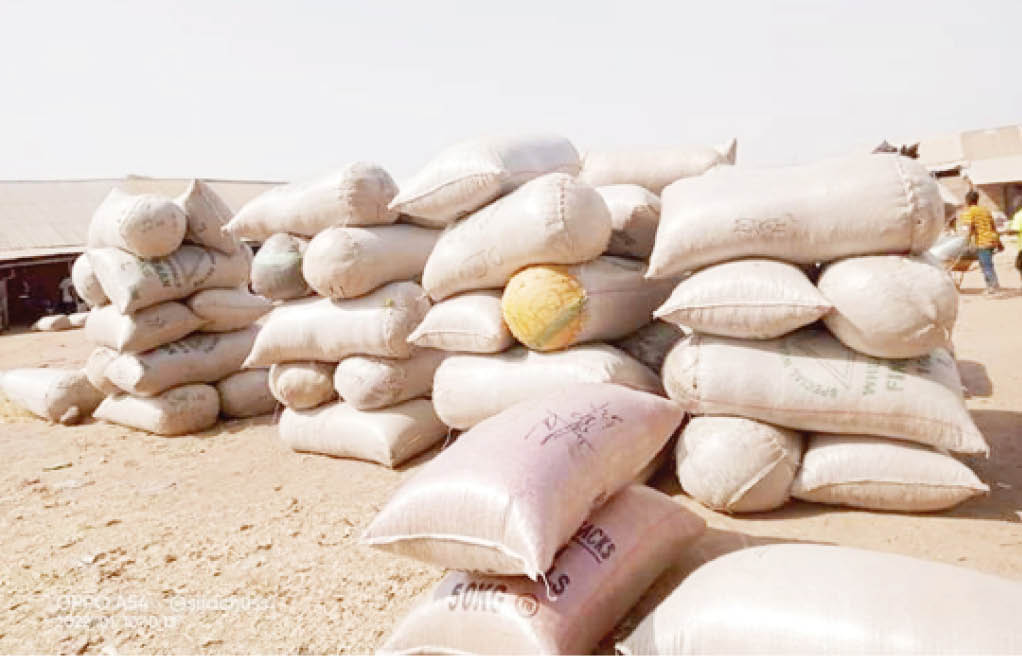Why Benue farmers are abandoning sesame farming
Farmers in Benue State are fast abandoning sesame (beniseed) production for alternative crops such as cassava, soybean and cowpea (bean). Before now, many farmers, especially in the two senatorial districts of Benue South and North West, were known for farming beniseed. Some of the farmers in the past could boast of a hectare which yielded […]

Bags of sesame
Farmers in Benue State are fast abandoning sesame (beniseed) production for alternative crops such as cassava, soybean and cowpea (bean).
Before now, many farmers, especially in the two senatorial districts of Benue South and North West, were known for farming beniseed.
Some of the farmers in the past could boast of a hectare which yielded 10 bags of 100kg under cooperate arrangement where each of the farmers produced one tonne of beniseed on their apportioned space.
If the harvest was good, at least 35 of such farmers, each of who when allocated a hectare, would turn out 350 bags of beniseed which in turn would increase their personal income.
At the time of this report, a 100kg bag of beniseed sold for at least N90,000 in local markets across the state.
Interestingly, the market opportunities, according to some of them who spoke to our correspondent in Makurdi, have never been in doubt, just as they (farmers) sometimes even fall short of demand of the produce.
But in recent times, majority of them have shifted attention from cultivating beniseed to alternative crops.

Ekoja Peter, a young farmer who in the past had engaged in the production of beniseed in Otukpo Local Government Area (LGA), said he now cultivated cassava in large quantity because of quick income generation.
He said it was easier making money from cassava than relying on beniseed which productivity in the past four years disappointed him.
Peter said, “I feel better doing cassava farming now. I veered into cassava since two years ago after my beniseed harvest was nothing to be proud about for two consecutive years.”
Similarly, Elahi Eja, who farmed beniseed in Ugboju-Otukpo, explained that she abandoned it for cassava and cowpea because of poor harvest since 2018.
Eja said despite the high cost of beniseed in the market now she was more comfortable farming cassava and cowpea.
For another farmer in Gboko LGA, Atondo Titus, his beniseed farming seemed tedious and that was why he drifted to soybean while doing beniseed on a smaller scale.
He said, “It’s not easy getting one bag of beniseed harvest. Where you get five bags of soybean, you may not get a bag of beniseed. Though, the price of beniseed is far higher than soybean and there is market for the produce, however, the process of farming beniseed is more tedious.
“Soybean and cassava farming are less tedious and there are bigger markets for the crops. Soybean price in the past two years has skyrocketed in the so that’s why farmers are shifting their interest from beniseed farming. I’m still farming beniseed but on a smaller scale, while I now do soybean on a large scale.
But, the Director of Agric Science at the Ministry of Agriculture and Natural Resources, Thomas Unongo, contended that the drifting from beniseed production might not be actually as much as it seemed, but that effort was on top gear to reverse the trend.
He said, “Actually, the diversion is not much, and the reason not far-fetched. There was a sharp decrease in the price of the commodity about two or three years ago, while there had been another sharp rise in alternative crops like soybean, so everyone in Benue now knows that there is money in farming. Everyone is at alert and wants to go into what can bring back something tangible for them.
“Another factor is the issue with very high yielding varieties; somebody (farmer) could then crop about a hectare of beniseed and would be unable to get up to four or five bags; the reason is simple, they were not using updated high yielding varieties.
“They were using the old seeds, but of recent, about three years ago, there had been some great intervention by the federal government in sesame production, so the seeds are coming; they are everywhere. The beniseed value chain is growing in the country. The group into beniseed production even has a national body; the commodity has a national body of producers and processors; even in Benue.
“We have branches in almost all the 23 LGAs that are sensitising people on the need to use the improved varieties. There are two species – white and brow – both of them are high-yielding and the demand from the Asian market is so high for the two varieties.
“You know we easily adapt to technology here, so we are thinking that in the next two years Benue will retain its status as the beniseed production state and a lot of people, including new entrants, will love to join the bandwagon and have serious yield for commercial purpose.”
On his part, the State Chairman of the All Farmers Association of Nigeria (AFAN), Aondongu Saaku, said the drift started as a result of lack of export market where the commodity was needed mostly.
Saaku explained that, “It was because there was no market. The market was not moving, but we are reactivating that market. It will come back to mainstream production; it’s even a value chain commodity.
“The major means of exportation is our problem because we have to export the beniseed. It’s an exportable product. The diversion by farmers to cassava is because of the cassava factory that has now come. When you have something near, you take advantage of it.”
